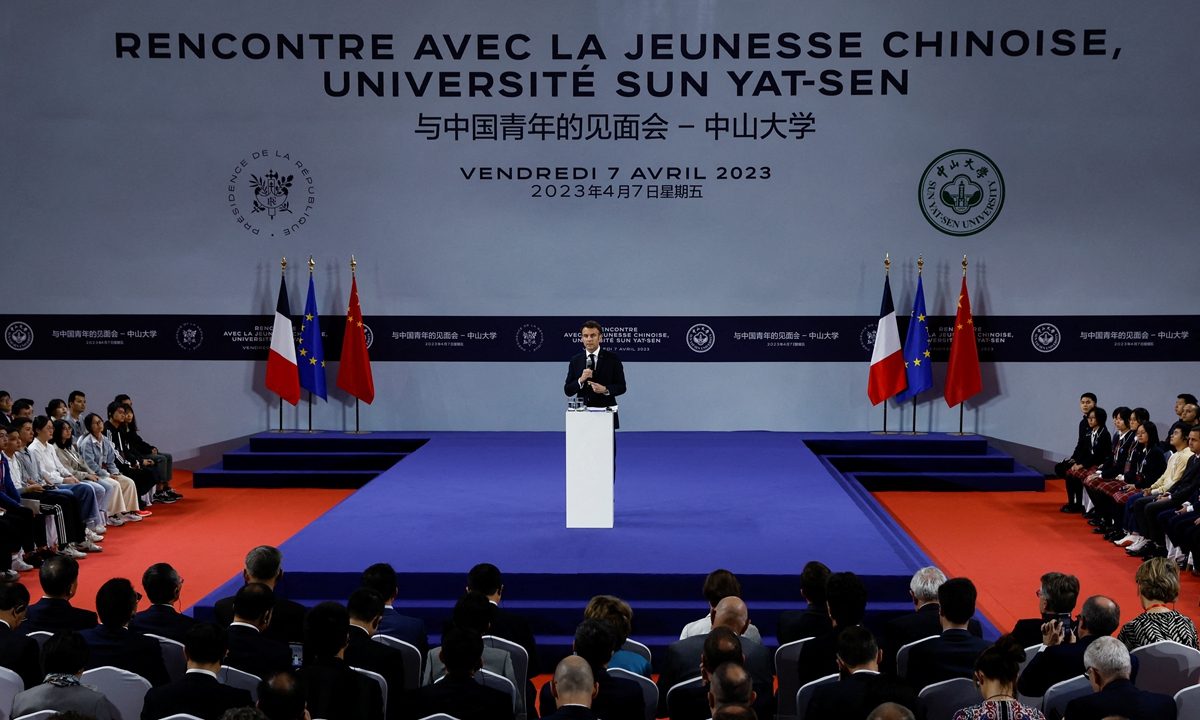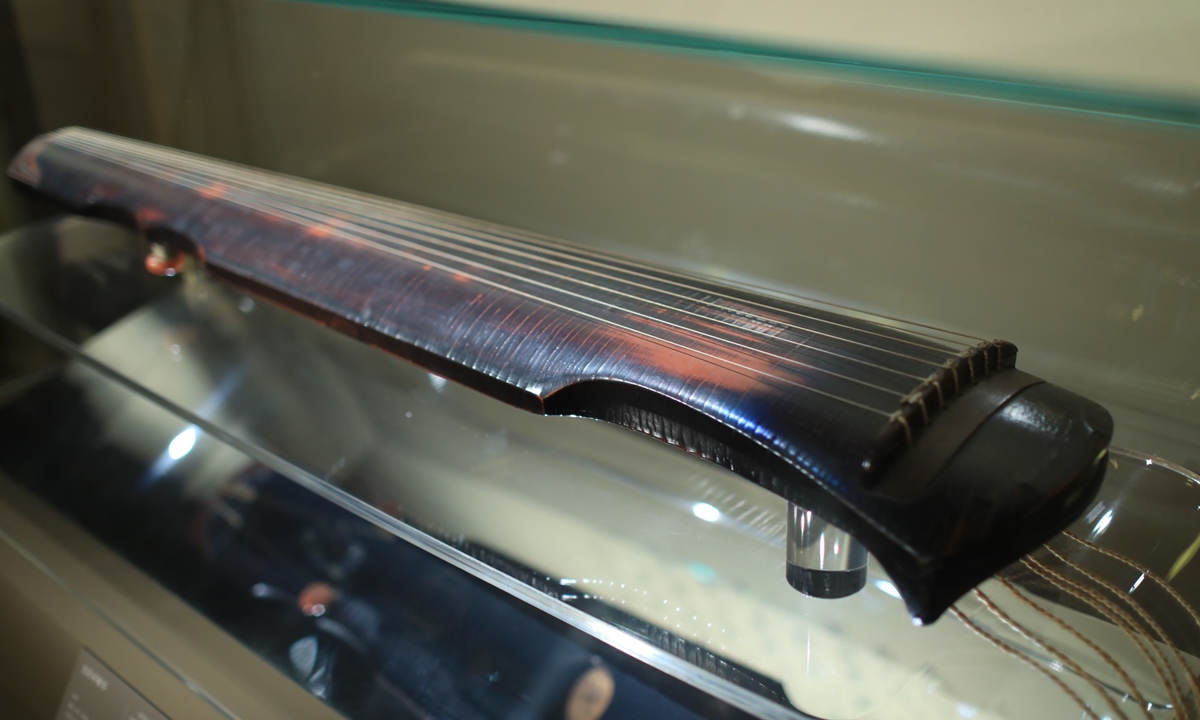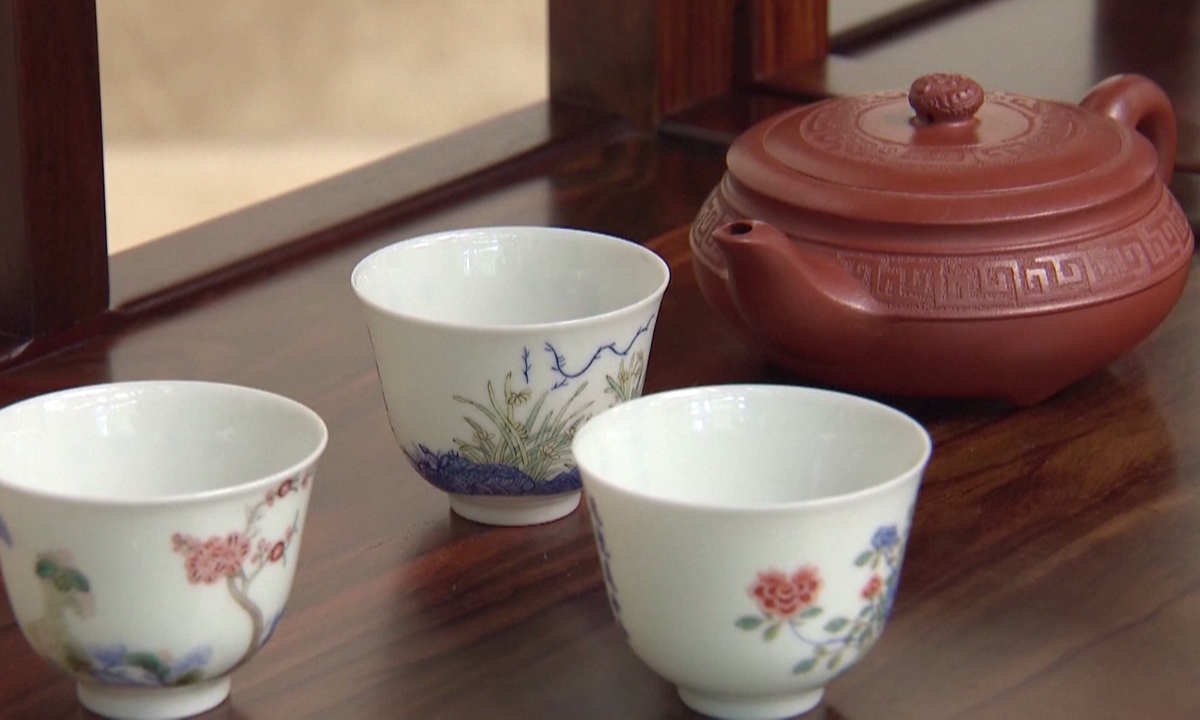ARTS / ART
Music, tea, friendship... highlights of Macron’s China visit
Cultural diplomacy

French President Emmanuel Macron gives a speech at Sun Yat-sen University on April 7, 2023 in Guangzhou, Guangdong Province. Photo: VCG
French President Emmanuel Macron's 2023 visit to China ended on a pleasant note on Friday as the French leader tweeted "Long live the friendship between China and France."With Macron tasting Lingnan tea and enjoying a music performance of a 1,267-year-old guqin, one of the oldest Chinese musical instruments, in Guangzhou, South China's Guangdong Province, cultural exchange has been a key theme of the three-day visit. The French leader noted that a "hand-in-hand" cultural collaboration will expand to a "significant" level in 2024, a year that marks the 60th anniversary of the establishment of diplomatic ties between China and France.
More than music
"What was the name of the tune?" the French president asked after listening to a guqin music piece called "Gao Shan Liu Shui" (High Mountains and Flowing Water) during an informal meeting with Chinese President Xi Jinping in Guangzhou on Friday.
Made from the wood of a Chinese parasol tree, the guqin used in the performance is China's national treasure. The instrument is called Jiuxiao Huanpei (Jade Pendant of Highest Heaven), and it was made during the Tang Dynasty (618-907), with an estimated worth of 400 million yuan ($58.22 million).
The back of the guqin is engraved with calligraphy by Su Shi, one of the greatest Chinese literati of the Song Dynasty (960-1279).

Jiuxiao Huanpei, a famous antique Chinese guqin made during the Tang Dynasty (618-907) Photo: VCG
Xue Liyang, an ancient music instrument expert, told the Global Times that the guqin is the "embodiment of ancient Chinese philosophy," and it is intertwined with the "Chinese values of elegance, truth, benevolence and beauty.""The performance gave people of different cultural backgrounds a taste of the ideological aesthetics of ancient China," Xue noted.
"High Mountains and Flowing Water" has strong symbolic meaning in Chinese culture as the tune is closely connected to the story of guqin player Bo Ya and woodcutter Zhong Ziqi.
It represents the "tacit understanding and mutual appreciation between two people on art," Xiao Shuming, a cultural researcher, told the Global Times.
According to the story, Bo Ya was playing music one day when he was overheard by a passing woodcutter. As Bo Ya played a piece to capture the grandeur of the high mountains, the woodcutter remarked, "Towering like Mount Tai!" Bo Ya then played a tune in the spirit of flowing water, and Zhong exclaimed, "How vast are the rivers and oceans!" Bo Ya then realized that he had met someone who truly understood him. It is said that when Zhong passed away, Bo Ya broke his instrument, since he knew no one would ever understand his music as his friend had done.
The tune itself was divided into two parts, "High Mountains" and "Flowing Water," after the Tang Dynasty.
Though the French president was only able to hear "Flowing Water" during the performance, this still shows that "China sees France as a friend of mutual goal," Xiao noted.
Macron was also offered two types of Oolong and Chinese black tea during his Guangzhou visit. Cultural sociologist Chu Xin told the Global Times that local cultural products have long been seen as a "soft yet effective" means of "diplomatic strategy" used to draw countries closer.

The tea set used during the informal meeting between Chinese President Xi Jinping and French President Emmanuel Macron Photo: VCG
"Human beings' emotions and memories are closely related to their tastes. Such local tastes show the authentic and special cultural image of a country," Chu noted.Back in 2019, Macron sent a bottle of fine Romanee Conti 1978 wine to China as a gift to mark the anniversary of the start of China's reform and opening-up in 1978.
"China and France are two countries that respect the development of the humanities and we are both good at using 'lyrical borrowing' to convey the hopes in our hearts," Xiao noted.
Deepening exchanges
Besides these cultural activities, the French president also visited Sun Yat-sen University in Guangzhou.
Using local Cantonese to greet students, Macron hosted a university session to reveal his hopes for China-France exchanges in fields such as the humanities, science and technology.
The bond between China's Yat-sen University and France was established much earlier in the 1920s.
Supported by pioneers such as Sun Yat-sen, the Institut Franco-Chinois de Lyon was the only institution of higher education China established overseas. It operated from 1921 to 1950.
The predecessor to Sun Yat-sen University, National Guangdong University, was a member of the preparatory committee of the Institut Franco-Chinois de Lyon, which allowed it to witness the early cultural exchanges between China and France.
Due to this historical link, the Chinese university became the earliest in South China to establish French as a major. It has also carried out collaborative research programs with more than 30 French universities.
Macron said he hopes more young Chinese students will learn French and that young French people will share the same passion for Chinese civilization, culture and language.
Arriving in China on Wednesday, Macron's first stop was the opening ceremony of the China-France Croisements Festival in Beijing.
Accompanied by French figures such as director Jean-Jacques Annaud and Catherine Pégard, the president of the Palace of Versailles, Macron encouraged stronger "cross-cultural arts dialogue" between China and France at the ceremony.
He said that the two countries will walk "hand-in-hand" to continue diverse cultural collaborations in various fields such as museums, art and film to mark the "significant occasion" of the 60th anniversary of the establishment of diplomatic ties between China and France in 2024.
To thank China for its warm welcome, the French president presented two photographs of Marc Riboud, the French arts pioneer who was the first Western photographer to document the People's Republic of China during the 1950s, as gifts.
"Historically, Chinese civilization provided Asian wisdom to Europe, especially during the French Enlightenment in the 18th century. The French Revolution and French culture also had a profound impact on China's modernization process," Wang Xuebin, a professor with the Party School of the CPC Central Committee, told the Global Times.
"Cultural exchanges have never been a one-way street," Chu also noted.
